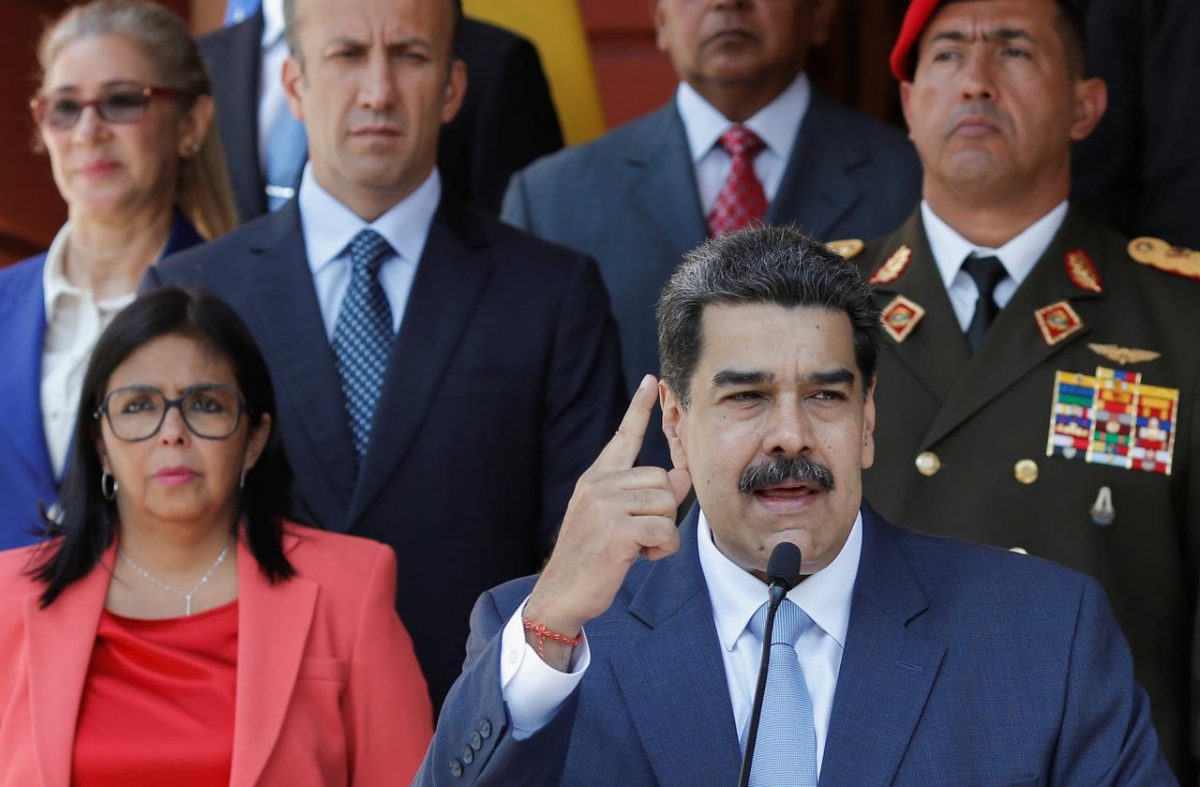WASHINGTON, (Reuters) – The Trump administration today offered to begin lifting Venezuela sanctions if the opposition and members of President Nicolas Maduro’s Socialist Party form an interim government without him, marking a shift in a U.S. policy that has failed to end his grip on power.
With the South American nation squeezed by low world oil prices, a spreading coronavirus pandemic and a U.S. economic pressure campaign, Washington moved to a more toned-down approach aimed at promoting fair elections as soon as this year to end the political crisis there.
Secretary of State Mike Pompeo formally announced the administration’s power-sharing “Democratic Transition Framework” for Venezuela, which proposes for the first time a “sequenced exit path” from tough U.S. sanctions, including on the vital oil sector, if Maduro and his allies cooperate.
But it will be no easy task to draw Maduro or his associates onto a path of political reconciliation with opposition leader Juan Guaido, recognized by the United States and more than 50 other countries as the legitimate interim president.
Maduro has held onto power despite repeated U.S. efforts to oust him and shown no willingness to seriously negotiate an end to his rule. As such, Tuesday’s announcement could be seen as a bid by the administration to cut its losses and move on.
Under the U.S. proposal, both Maduro and Guaido would step aside and neither would be part of the transitional government.
The initiative comes less than a week after the U.S. government took a more confrontational tack, indicting Maduro and more than a dozen other current and former top Venezuelan officials on charges of “narco-terrorism,” accusations he dismissed as false and racist.
Maduro’s staying power has become a source of frustration for President Donald Trump, U.S. officials have said privately. Maduro retains the backing of the military as well as Russia, China and Cuba.
But the Trump administration hopes an energy dispute between Russia and Saudi Arabia that has contributed to the plunging price of oil – Maduro’s main financial lifeline – and the growing coronavirus threat will help make Maduro and his loyalists more pliable.
“The regime is now under heavier pressure than it has ever been,” U.S. Special Representative for Venezuela Elliott Abrams told Reuters earlier. “Maybe this pressure will lead to a serious discussion within the regime.”
The U.S. proposal, which Abrams said was approved by Trump, calls for the opposition-controlled National Assembly “to elect an inclusive transitional government acceptable to the major factions.” A council of state would govern until it oversees elections, which Pompeo said the United States hoped could be held in six to 12 months.
Though the administration has never wavered in public about its support for Guaido, he has struggled to muster the street protests of his first few months as opposition leader. Ordinary Venezuelans, weighed down by food shortages and hyperinflation, have increasingly expressed disappointment at his failure to achieve a change of government.
QUESTIONS ABOUT MADURO’S FUTURE
In an apparent softening of tone, Abrams told Reuters that while Maduro would have to step aside, the plan did not call for him to be forced into exile and even suggested that he “could theoretically run” in the election.
Pompeo insisted that “Nicolas Maduro will never again govern Venezuela,” but said the administration hoped he would take the U.S. proposal seriously.
“If the conditions of the framework are met, including the departure of all foreign security forces,” Pompeo told reporters, “then all remaining U.S. sanctions would be lifted.”
Venezuela’s information ministry did not immediately respond to a request for comment.
With experts deeming OPEC member Venezuela among the countries that could be hardest hit by the coronavirus, Guaido proposed over the weekend the formation of an emergency government of members across the political spectrum.
The U.S. plan seeks to build on the effort by Guaido as well as a failed round of negotiations between the two sides in Barbados last year, which the Trump administration dismissed at the time.
The proposal represents a significantly less bellicose tone from the administration’s pronouncements since January of last year, when Guaido invoked the constitution to assume a rival interim presidency, arguing that Maduro’s 2018 re-election was a sham. Maduro calls Guaido a U.S. puppet.
Asked whether the new proposal indicated the United States was backing away from Guaido, Pompeo said the administration remained “supportive of the work that the rightful president of the Venezuelan people, Juan Guaido, is engaged in.”
But the success of the plan, which calls for power-sharing between the Guaido-led opposition and Socialist lawmakers, would ultimately hinge on Socialist leaders turning on Maduro, the same strategy that Guaido has been unable to execute.
Socialist legislators are again considered unlikely to go along with the new U.S. plan.
Saul Ortega, a Socialist legislator, called the U.S. proposal a “dangerous escalation against our people” as it battles the coronavirus and said it had an “electoral stench” given Trump’s 2020 re-election campaign.
Under the proposal, individual sanctions on dozens of Venezuelan government officials could be lifted as soon as they give up their posts during the transition.
Broader economic sanctions, including on Venezuela’s oil sector and state oil company PDVSA, would be removed only after Maduro leaves office and all Cuban security forces and small Russian contingent are withdrawn, Abrams said.
“People should hire lawyers and start talking to the Department of Justice,” he added, saying the proposal would not have a mechanism to revoke U.S. indictments against Maduro and his loyalists.










